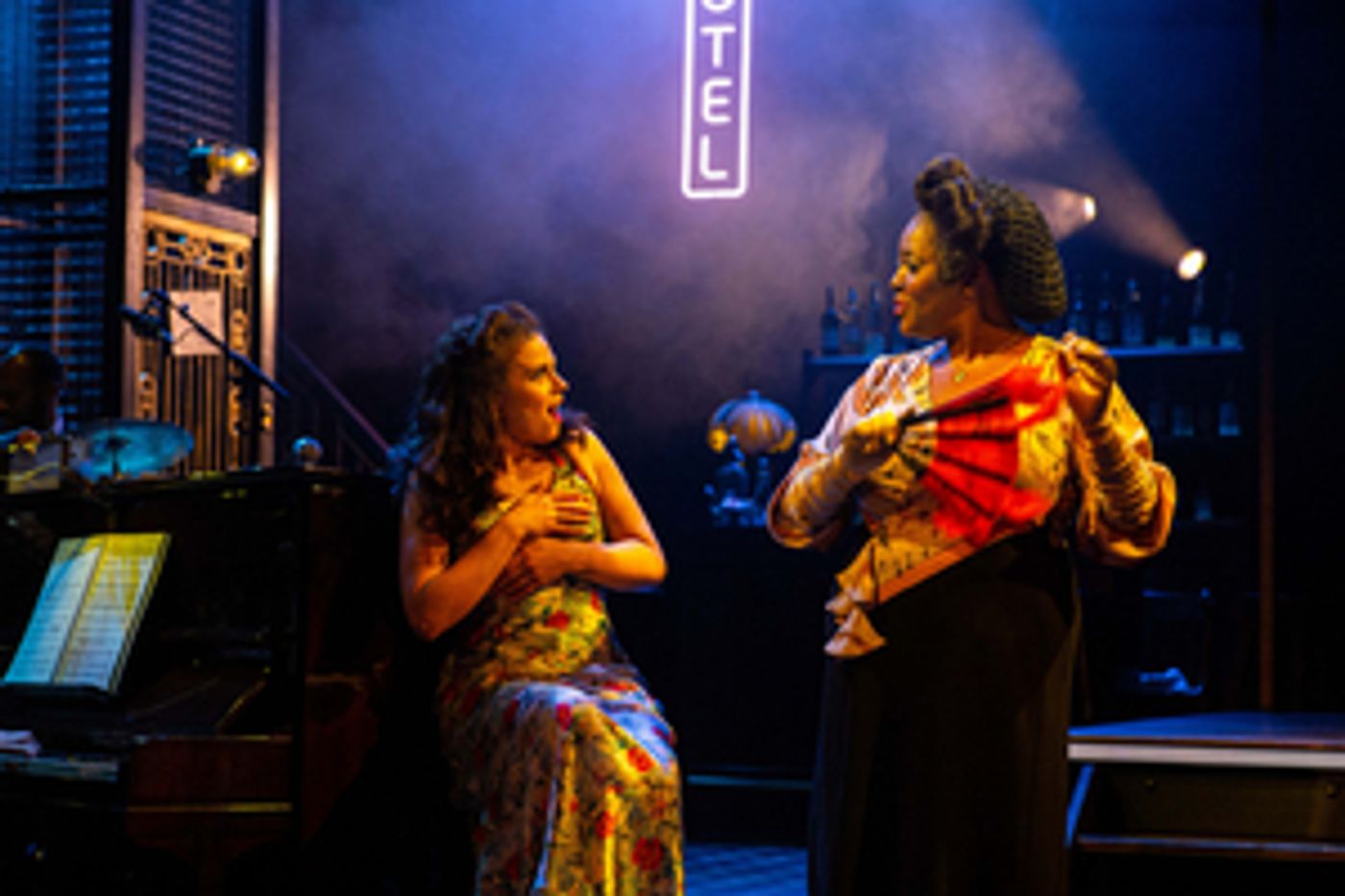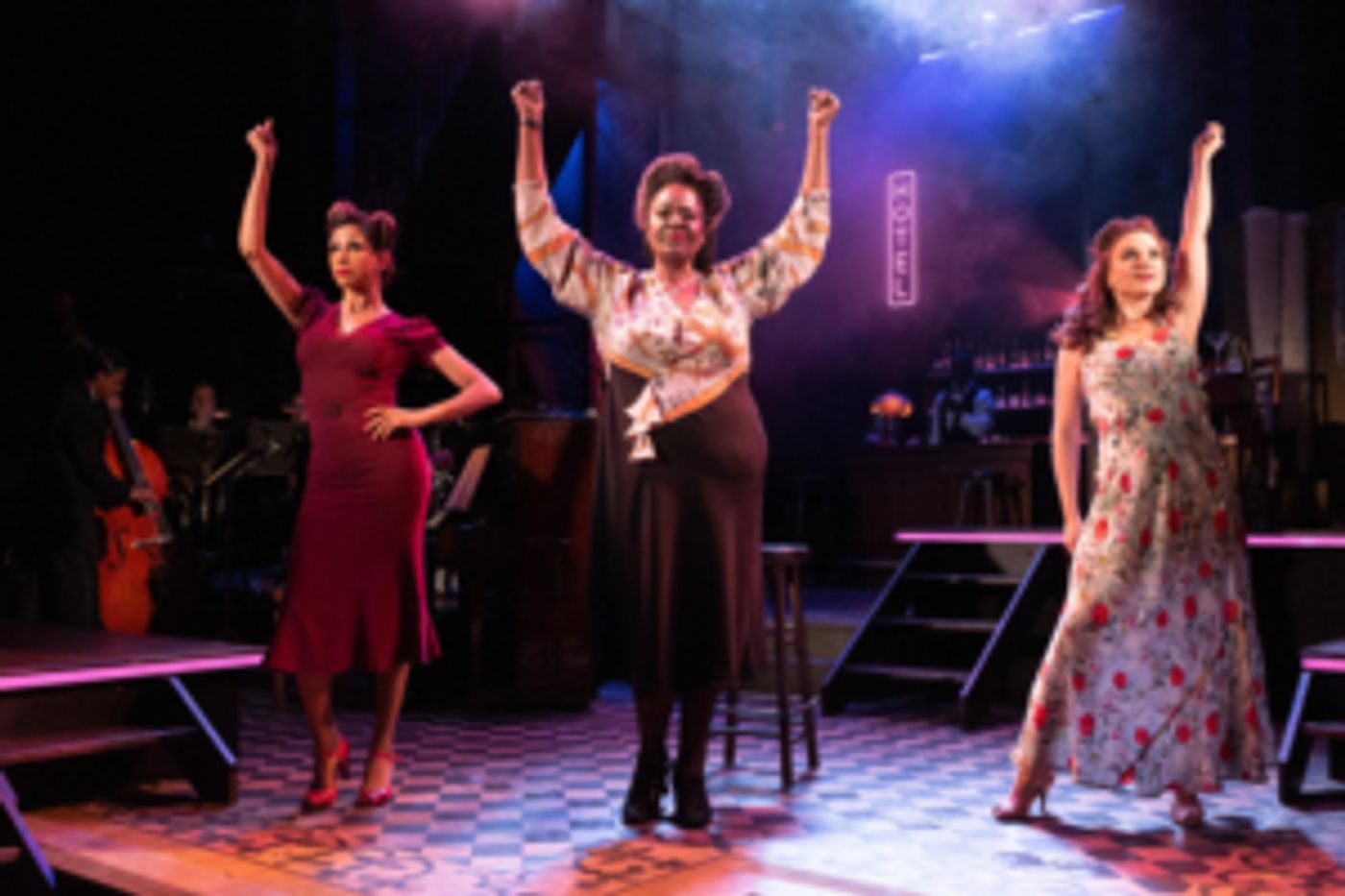Interview: Gemma Sutton Talks BLUES IN THE NIGHT at the Kiln Theatre

in Blues in the Night
Known for her recent work in The Rink at the Southwark Playhouse and Follies at the National Theatre, Gemma Sutton can currently be found singing the blues as the Girl at the Kiln Theatre in Blues in the Night.
Directed by Susie McKenna, Sutton stars alongside Sharon D. Clarke, Clive Rowe and Debbie Kurrup. BroadwayWorld spoke to her about the personal appeal of blues music, the history behind the show, and her favourite part of the development process of new work.
Might you explain in one sentence what it was like performing in Follies at the National?
It felt like a privilege to be on the Olivier stage surrounded by incredible talent and lovely people.
Why did Blues in the Night appeal?
I really like blues and jazz music as a genre. My dad used to play a lot of songs on the piano from the Thirties and Forties, so it's always been in my blood. What I like about this show is its opportunity to improvise. Other musicals are understandably more set, but this show demands creativity, artistry and playing. It's very liberating.
How do you decide to take on a production?
The main thing is if it's a challenge. I don't care if it's on a West End stage or a Fringe one. I like to learn new skills. For example, for Gypsy I learned how to baton twirl for the character of June - the challenge was doing the point work and the physicality. Working with other great creatives and actors who take risks, especially in Fringe venues where the financial risk is not as great, it's amazing how some jobs can lead me on unexpected paths.
What is the challenge of performing in Blues in the Night?
It's the demand each evening to reinvent. Tonight's show will be different to the last. It's not only a challenge but also an incredible joy to be singing with Debbie, Sharon and Clive. Singing harmonies can be difficult - you have to listen to the other people - but it is probably my greatest joy. Singing is good for the soul. Performing in this space is also a challenge: I was involved in the showcase version of the show that we performed in Hackney, which used a huge three-scale house set. Here at the Kiln, the show is given an intimacy.
Why can Blues in the Night move from such a large venue to such a small one - is it because of its focus on such intimate and personal music?
The songs are so timeless. The lyrics also speak to everyone and we can relate to them.

and Gemma Sutton in
Blues in the Night
How do you feel performing alongside Sharon, Debbie and Clive and with the band each night?
It's totally thrilling. Some of my favourite parts of the night are when I'm sitting on stage and listening to Sharon singing "Wasted Life Blues" and Clive singing "Baby Doll" and hearing the audience's reaction. The audience is really the other character of the piece. I take my hat off each night to the band, and they're giving us different phrases - it's lots of listening and playing and it keeps you aware and present.
When people are whooping and cheering, it must be difficult not to join in
The joy of my character, the Girl, is that she loves blues music. Because she's so open and naïve, she's not afraid to show such joy. The room the Girl is in, I imagine, is above the hotel foyer where the music is being performed, so I do tap my feet and have a dance.
What sort of research did you do for the role?
I absorbed myself in the music of the period - you want to sound of the time. I wanted to build a detailed backstory, as the show doesn't have the most complicated plot -though it was never designed for that. Susie's production has added details and layers, as she wanted to bring out the darkness and reality of the piece.
The audience would never know, but my character has run away from Ohio and her parents. Coming out of the Great Depression it was a period of great poverty, so she is basically 'white trash'. Her penpal boyfriend has booked this hotel room for her, but they've met only once. When I sing my solos such as "Willow Weep For Me", I have this story in my head, which hopefully means they carry more into the audience.
What drives your solo songs?
My three solo songs are "Taking a Chance on Love", "Willow Weep For Me" and "Reckless Blues". They are all different in tone and emotional feeling and musically. It's honing in on certain elements of her personality and exaggerating them.
"Taking a Chance" is about the excitement of love, but "Willow Weep For Me" has the Girl in a completely different place. The song is about broken dreams and she is missing home and considering her wrong choices. "Reckless Blues" has her drunk and she has lost all sense of hope and dignity.
What emotion would you associate with blues music?
Fundamentally, it's singing about the hardship of life and the wisdom that comes through experience. It brings depth to people and isn't all sad. It's a very truthful reflection of life, but it can be hopeful.
What have you learnt about the show since the Hackney showcase?
The beauty of having a second chance is that you can add layers. It was the same with Follies: though I wasn't part of the original production, I know the creatives watched the audience and then refined everything. Because I've played the Girl before during rehearsals, I could bring more to it. Plus I'm five years older as a person; she sings "I have a right to sing the blues", and inevitably as we get older we have more experience to draw upon.
What do you think is the biggest challenge that the industry will face in the coming years?
I think you see a lot of new theatres opening, which shows the industry is doing very well. What I am fearful of is the price of tickets rising in the West End: it cannot only be for the rich and it's not what theatre is about.
I think we must continue to champion British musicals, and I'd love more funding for new writers to be made available so the opportunity for workshops increases. The talent is extraordinary in this country and I'm sure we've got a Hamilton in us. Everybody's Talking About Jamie and Adrian Mole are fantastic. It is happening, but let's keep encouraging people.
Are you involved with any upcoming shows?
One of my favourite things is doing workshops. There's nothing right this second, but I like that stage because you're watching writers in the room. A song you love might get cut and the reasons why are amazing. The process fascinates me.
Is there a theatre you'd like to work in?
I'd love to work at the Old Vic and in Manchester at the Exchange. I'm from that part of the world, so it's always lovely to be close to family.
Is there a show you'd like to see on the London stage?
I think, and I promise you this is not just because I was in it, The Rink deserves another life. It was such a great piece for two women, which perhaps is why it was not an enormous success when it was premiered in 1984...
If you could see any show from the past, what would it be?
There's so many! People, Places & Things with Denise Gough. That's a recent one. And Laurence Olivier in any of the Shakespeare plays - there are awards named after him for a reason!
Why should audiences come and see Blues in the Night?
You'll have a thrilling night surrounded by brilliant music performed by people like Sharon D. Clarke and Clive Rowe, and you don't always get this level of performers in these smaller theatres. It will make you laugh, cry and dance.
Blues in the Night at the Kiln Theatre until 7 September.
Photograph Credit: Matt Humphrey
Videos

